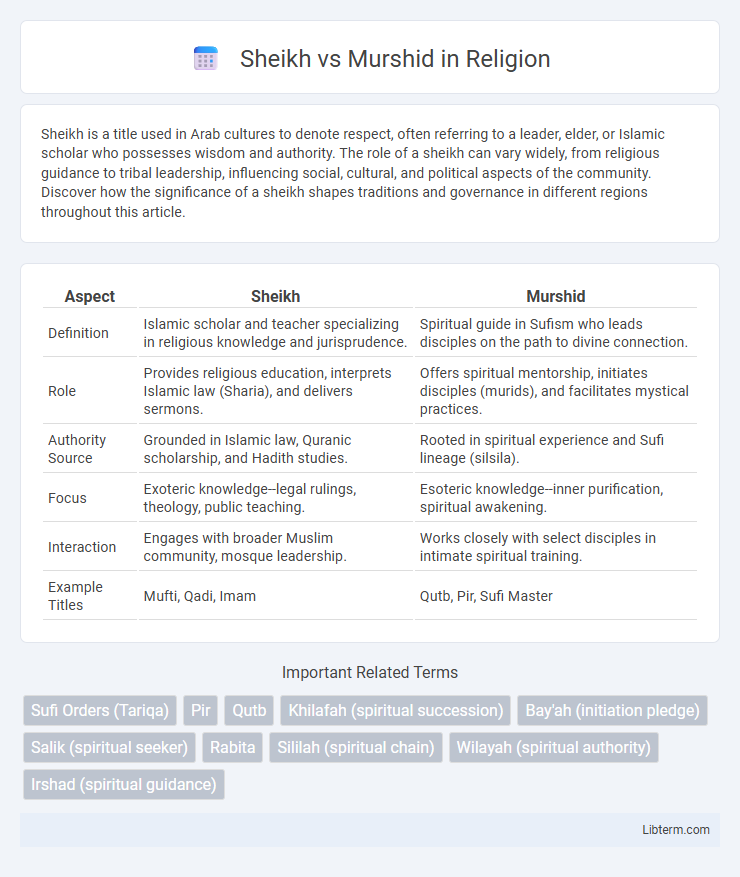Sheikh is a title used in Arab cultures to denote respect, often referring to a leader, elder, or Islamic scholar who possesses wisdom and authority. The role of a sheikh can vary widely, from religious guidance to tribal leadership, influencing social, cultural, and political aspects of the community. Discover how the significance of a sheikh shapes traditions and governance in different regions throughout this article.
Table of Comparison
| Aspect | Sheikh | Murshid |
|---|---|---|
| Definition | Islamic scholar and teacher specializing in religious knowledge and jurisprudence. | Spiritual guide in Sufism who leads disciples on the path to divine connection. |
| Role | Provides religious education, interprets Islamic law (Sharia), and delivers sermons. | Offers spiritual mentorship, initiates disciples (murids), and facilitates mystical practices. |
| Authority Source | Grounded in Islamic law, Quranic scholarship, and Hadith studies. | Rooted in spiritual experience and Sufi lineage (silsila). |
| Focus | Exoteric knowledge--legal rulings, theology, public teaching. | Esoteric knowledge--inner purification, spiritual awakening. |
| Interaction | Engages with broader Muslim community, mosque leadership. | Works closely with select disciples in intimate spiritual training. |
| Example Titles | Mufti, Qadi, Imam | Qutb, Pir, Sufi Master |
Defining Sheikh and Murshid: Key Terminologies
Sheikh refers to a respected Islamic scholar or elder who often leads a community through religious knowledge and jurisprudence, emphasizing authority in traditional teachings. Murshid denotes a spiritual guide in Sufism, responsible for directing disciples on the path of inner purification and mystical experience. Both roles are pivotal, with Sheikh focusing on legalistic and scholarly leadership while Murshid guides esoteric spiritual development.
Historical Origins and Evolution
The terms Sheikh and Murshid have distinct historical origins rooted in Islamic spiritual traditions, where Sheikh originally denoted a tribal elder or learned scholar, evolving into a title for respected Sufi masters. Murshid specifically refers to a spiritual guide or teacher who leads disciples on the Sufi path, emphasizing the transmission of esoteric knowledge and mystical practices. Over centuries, both roles have evolved with regional variations, reflecting shifts in religious, social, and cultural contexts within Islamic mysticism.
Roles and Responsibilities in Sufism
Sheikh in Sufism serves as a spiritual guide responsible for instructing disciples in mystical practices and ethical conduct, ensuring proper adherence to the path of spiritual purification. Murshid holds a similar role but often carries greater authority in overseeing the spiritual development of followers, providing personalized mentorship tailored to individual needs. Both Sheikh and Murshid facilitate the disciple's connection to divine knowledge, but the Murshid typically embodies a higher hierarchical status within the Sufi order.
Types of Spiritual Authority
Sheikhs represent formal spiritual authority in Sufi traditions, often recognized as lawful teachers with established lineages and the ability to initiate disciples into specific tariqas. Murshids serve as personal spiritual guides, focusing on intimate mentorship and tailored instruction for individual seekers, emphasizing direct experiential knowledge of the divine. The distinction highlights different types of spiritual authority: institutional and hereditary (Sheikh) versus personalized and experiential (Murshid).
Significance in Islamic Spiritual Lineages
Sheikh and Murshid are pivotal figures in Islamic spiritual lineages, each representing distinct roles in the transmission of Sufi knowledge and guidance. The Sheikh is often seen as a venerable spiritual master who imparts wisdom and leads disciples in spiritual practices, while the Murshid serves as a direct guide and mentor, facilitating the disciple's personal journey towards spiritual enlightenment. Their significance lies in preserving authentic teachings, fostering spiritual growth, and maintaining the continuity of Sufi traditions within Islamic mysticism.
Paths of Spiritual Guidance
Sheikh and Murshid represent key figures in Islamic mysticism, guiding seekers along spiritual paths with distinct roles; a Sheikh typically offers comprehensive mentorship rooted in established Sufi orders, emphasizing doctrinal teachings and personal development. Murshid often serves as a direct spiritual guide who provides individualized instruction focused on inner purification and experiential knowledge of the divine. Both embody essential functions in nurturing spiritual growth, with the Sheikh guiding communal and traditional practices while the Murshid fosters intimate, transformative journeys toward enlightenment.
Distinctions in Teaching Methods
Sheikhs employ traditional, authoritative teaching methods rooted in direct transmission of knowledge through structured lessons and recitations, emphasizing memorization and strict adherence to classical doctrines. Murshids prioritize personalized guidance, focusing on spiritual development through experiential learning, meditation, and introspective practices tailored to individual disciples. This distinction shapes the learner's journey, with Sheikh-oriented instruction cultivating scholarly understanding, while Murshid-led mentorship fosters deep inner transformation and intuitive insight.
Relationship with Disciples
A Sheikh acts as a spiritual guide who provides personalized mentorship and theological education to disciples, fostering a close, nurturing relationship based on trust and guidance. A Murshid holds a higher spiritual authority, often viewed as a divine conduit, cultivating a profound, transformative bond that encompasses both spiritual awakening and lifelong commitment. The disciple's relationship with a Murshid is deeply rooted in obedience and surrender, whereas with a Sheikh, it emphasizes learning and moral development within a guided framework.
Regional and Cultural Variations
The terms Sheikh and Murshid hold distinct meanings within various Islamic communities, reflecting regional and cultural nuances. In South Asia, "Murshid" often refers to a spiritual guide in Sufi traditions, emphasizing personal guidance and mystical insight, while "Sheikh" commonly denotes a respected elder or religious scholar with authority in Islamic law. In contrast, Arab cultures may use "Sheikh" to signify tribal leaders or prominent figures in political and social contexts, whereas "Murshid" remains closely associated with Sufi mentorship and inner spiritual development.
Contemporary Relevance and Challenges
Sheikh and Murshid roles remain crucial in contemporary Sufi communities, guiding spiritual growth and ethical conduct. Modern challenges include balancing traditional teachings with globalized, diverse audiences and addressing skepticism toward mystical practices. Effective Murshids adapt by integrating digital platforms to sustain relevance and foster inclusive spiritual experiences.
Sheikh Infographic

 libterm.com
libterm.com